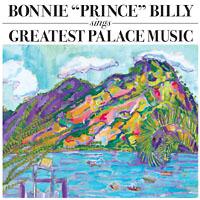Alta-Rock Royalty: Bonnie "Prince" Billy
Calling himself Palace Music, or Palace Brothers, or Push, and of late Bonnie “Prince” Billy, the enigmatic Will Oldham, aided by a group of musical cohorts, has been making a spare brand of dry, mournful country/rock music for more than a decade. Before the term alta-country had been coined, it could be argued, the 34 year old Oldham had both invented and perfected the musical form on a series of genre-shattering albums issued on the Chicago based Drag City label beginning in 1993.
The earlier recordings, including 1994’s Palace Brothers (Drag City DC50 LP/CD) and 1997’s Lost Blues and Other Songs (DC110 2LP/CD) featured the younger Oldham sounding more like a world-weary, sometimes croaky-voiced mountain man than the post-adolescent Kentucky born suburbanite that he was when he recorded there is no one what will take care of you, his first album issued in 1993.
Like the young Bob Dylan, Oldham has created a convincing musical persona who often sounds far older than his years, but because his creation is less cartoony, and hasn’t modulated over time as wildly as Dylan’s, Oldham has actually done it more convincingly. I’m not suggesting that Oldham’s talents and accomplishments match Dylan’s, but it would not be a stretch to suggest that the audaciousness and uniqueness of Oldham’s musical esthetic equals Dylan’s. You may come away thinking more of the darkness and loneliness of Hank Williams or the warbling of Neil Young, than of any connection to Dylan.
Oldham’s evocative poetry is earnest and often tender and romantic, but while he sings of love, he never descends into bathos, more often than not shaking the listener with the addition of enigmatic and sometimes seemingly mundane or oddly humorous observations. His lyrics are invested with a uniquely American brand of stoicism tinged with an old-time country religiosity that’s more suggested than preached overtly. Oldham’s ability to work around the edges of his subject matter makes his songs worth revisiting often. Among his long-standing interests are God, dogs, and horses, none of which he seems that interested in literally, as much as metaphorically.
Over the years, despite his prodigious recorded output, Oldham has carefully managed his image, limiting his exposure in the press and constantly changing his physical appearance in carefully measured permutations. When he does submit to interviews, his responses are often enigmatic and usually wise beyond his years.
The result has been a long and successful but muted career arc, in which the artist creates and performs on his own terms, while dealing with and acknowledging the realities of musical commerce. When Oldham performs live, his devoted fans show up around the world, and fan run websites abound.
On his latest album in his Bonnie “Prince” Billy persona, Oldham’s produced his most commercial outing to date: a “greatest hits” compilation, with all of the songs re-recorded, reconfigured and emotionally reconsidered, using many of his long time musical collaborators, plus crack Nashville studio musicians.
For those who might have found the original recordings too spare and sometimes even bleak, these new, sumptuously arranged, commercially produced versions, framed in the palliatives of pedal steel, pianos, fiddles and female backup singers, offer a more soothing entre, without losing any of the power, mystery, romanticism or intimacy of the originals. Because they were recorded live, with just a few overdubs and “punch ins,” this is honest music-making and not a capitulation to contemporary Nashville pop-dreck.
Comparing the original spare takes with these mostly exuberant versions is the only way to fully appreciate the brilliance of what Bonnie “Prince” Billy has done here. If you’re a fan and listen superficially you may confuse his intentions and see this as a sell-out. For instance, the original “Ohio River Boat Song” from Palace Music (Drag City 110 LP/CD) plays out like a slowly drawn, brooding, weightly Celtic ballad, while the remake here has a sunny, jaunty disposition that seems to transform it into an optimistic, lightweight love song.
The exquisitely melodic “Gulf Shores,” also from Palace Music, goes from oddly wistful and hesitant, to stately and sophisticated. The mournful Hank Williams-like “You Will Miss Me When I Burn,” from Palace Brothers with its chorus of “When you have no one, no one can hurt you,” is about as sad and desolate a lament as you’ll hear on the original—just Oldham and his guitar with the room acoustic intact. The remake lets the searing pedal steel and fiddles do the wailing, and almost revels in its misery. A female backup singer comforts the singer in the chorus.
By rounding off, warming up, and increasing the tempos of his creations, Bonnie “Prince” Billy has burnished the rich melodic impulses buried in many of his originals. Ironically, by doing so, he’s made the originals both far more accessible and at the same time, far more powerful. If his goal was to both gain new listeners and to entice them to search back through the rich catalog, Sings Greatest Palace Music must be declared a total success.
Sonically, while this album has more compression and studio gloss than the stunningly transparent “lo-fi” (actually hi-fi by audiophile standards) originals, the recording is analog and effectively natural—and that’s the CD. The two LP set has yet to arrive. Highly recommended for both long time fans and those unfamiliar with this absolute original. Also highly recommended: the Steve Albini engineered Viva Last Blues(DC65 LP/CD) and Palace Music(CD110 LP/CD)
.
A full length interview I conducted with the enigmatic Bonnie “Prince” Billy last winter will be posted on musicangle.com soon.



